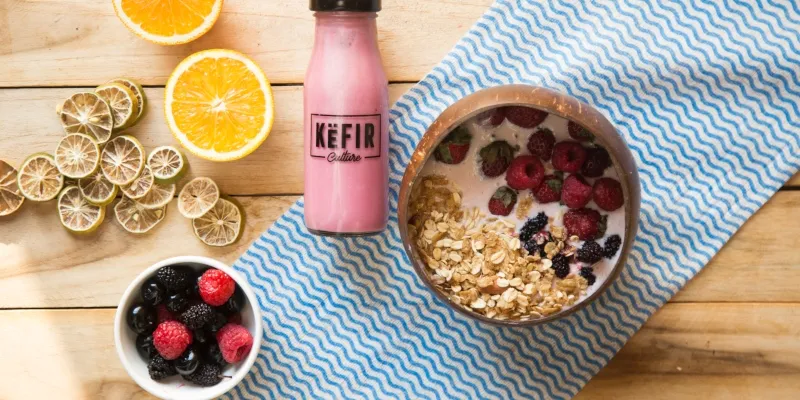No guts, no glory: this bootstrapped Mumbai startup is making probiotics consumption yummy with its kefir milkshakes
Mumbai startup Kefir Culture whips up healthy milkshakes using gut-friendly probiotics from kefir, a fermented milk known for its great stomach healing and digestive properties.
Digestive troubles are a given, thanks to our hectic lifestyles and increasing stress levels. Our diet today – high in sugar and processed foods – is also causing serious damage to our health. According to a report by NCBI, over 250 million Indians suffer from acidity, and Irritable Bowel Syndrome (IBS) afflicts over 30 percent of the Indian population.
And no matter how health conscious a person is, sneaking in that yummy dessert or cheesy snack is inevitable at times. While the wrong bacteria in the wrong place can cause problems, the right bacteria in the right place can have multiple benefits. This is where probiotics come into picture. They are live microorganisms that promote a healthy digestive tract and immune system.
Yogurt is said to be the best source of probiotics as it is packed with proteins and bacteria that make digestion easier and better. Another not-so-popular probiotic is ‘Kefir’ - an ancient fermented drink that is a lot like yogurt in consistency, but is much more beneficial for good gut health.
After realising the health benefits of kefir, two school friends - Ricky Marfatia (31) and Aakanksha Patel (30) - started Kefir Culture in January 2019. The Mumbai-based startup, which makes Kefir-based milkshakes, is redefining the way probiotics are consumed.
“Unlike yogurt-based drinks that provide temporary relief to digestion, Kefir has multiple beneficial yeasts and bacteria that stay within your gut and colonise to provide you with optimal digestive health. It is 99 percent lactose free, and even lactose intolerant people can enjoy the long list of benefits provided by Kefir,” says Aakanksha.

Kefir Culture founders Ricky and Aakanksha wanted people to experience the benefits of kefir in a fun format.
First steps
An avid yogurt consumer, Ricky decided to explore healthier alternatives for probiotic dairy about two years ago. During his research, he stumbled upon kefir and was impressed with its benefits and unique taste. Hence, Ricky put his plans of becoming a lawyer on the backburner, and followed his gut to launch his own brand. Ricky who was already running some restaurants had the funds to funnel into Kefir Culture.
His friend Aakanksha decided to join him, as she was interested in building and marketing the product. With a marketing and advertising background, and a self-proclaimed baker-at-heart, she was the perfect fit for Kefir Culture.
With 25 employees to manage all the divisions of the business, the founders state they are targeting to employ about 125-150 people by the end of 2020.
Shaken, not stirred
After various experiments with new recipes, deploying consumer tests and developing flavours, the duo made diverse flavoured milkshakes with kefir, and marketed it under the brand 'Kefir Culture'.
While Aakanksha and Ricky’s venture did see the light of the day, they faced many challenges in their journey. Aakanksha says, “The two key challenges we faced were primarily cold chain logistics and the unorganised retail sector in India.”
The delicate nature of the product and the short shelf life it had was tackled by moving their cold chain logistics in-house. Another challenge they had to deal with was the unorganised retail market sector in India, which they had undertaken by following the method used by modern trade outlets.
Although probiotics is a necessary ingredient in everyone’s diet, their target was to acquire the emerging trend of ‘Super Consumers’, usually aged between 28 and 42 years and have a high disposable income that they invest in their health and lifestyle.

From milkshake staples like banana, strawberry, and honey vanilla, to unique flavours such as ‘Maple Cinnamon’ and ‘Mixed Berry’, Kefir Culture whips up some delicious gut-friendly milkshakes.
The founders claim they wanted to change the eating habits of this target group by offering them milkshakes with high nutritional value.
According to Kefir Culture, several nutritionists like Payal Kothari and Naini Setalwad advocate its products to their clients, especially to those who are lactose intolerant, and IBS or acid reflux patients.
How to make a great kefir shake
Most of the startup’s raw materials are sourced locally, and the most essential ingredient--milk--is procured from a farm in Maharashtra. Each batch of milk is then sent for a two-day manufacturing process in a temperature-controlled sterile environment. Later, this processed milk is refrigerated under four degrees temperature.
In order to prepare the ‘natural’ kefir, the founders claim to have locally sourced 100 percent organic cow’s milk. As kefir is made using live bacteria and yeast, it was necessary for them to make their product with utmost care by using their hands.
From milkshake staples like banana, strawberry, and honey vanilla, to unique flavours such as ‘Maple Cinnamon’ and ‘Mixed Berry’, Kefir Culture whips up some delicious gut-friendly milkshakes.
The products are distributed across Mumbai and neighbouring districts through in-house reefer vans, and are sold directly to the customers at home, or can be ordered online through their website. One can also opt for subscription models on their website.
Milking the gut health market
The demand for probiotics is growing globally, thanks to rising health awareness. According to TechSci research, the probiotic market in India will grow at a Compound Annual Growth Rate (CAGR) of 19.8 percent by 2020.
Currently bootstrapped, Kefir Culture has a recurring customer base of 70 percent. Its natural flavoured shake is priced at Rs 89 per bottle, and other flavours are priced at Rs 99. It follows the markup revenue model, and the products are sold both through retail stores and directly to the customers. However, the founders claim their revenue is higher when sold directly to its customers.
In February this year, Kefir Culture’s monthly sales crossed Rs 2,50,000, and it is targeting sales of around Rs 7,50,000 by the end of the next six months. For the remaining months of the calendar year, its projected growth rate is 40-45 percent. By next financial year, the owners say they will be looking at external funding.
Kefir Culture competes with MO’s Superfoods. Other players operating in the milkshake market include Keventers, Frozen Bottles, etc.
“Our immediate plan is to build category awareness and educate about kefir and its benefits through numerous touchpoints - including, but not limited to PR, affiliate programmes via nutritionists and doctors, trade shows and pop-ups, etc. In our opinion, the category comes first and if we grow the category, the product and brand is likely to grow with it,” says Aakanksha.
Kefir Culture’s main goal is to cover the whole of Maharashtra by next quarter. It is also planning to branch out to Delhi and Bengaluru by the end of this year.




![[Startup Bharat] Kochi-based monQo turns up the heat in the milkshake market to take on Kevente...](https://images.yourstory.com/cs/2/79900dd0-d913-11e8-a160-45a90309d734/MONQO1556281423691.png?fm=png&auto=format&h=100&w=100&crop=entropy&fit=crop)






